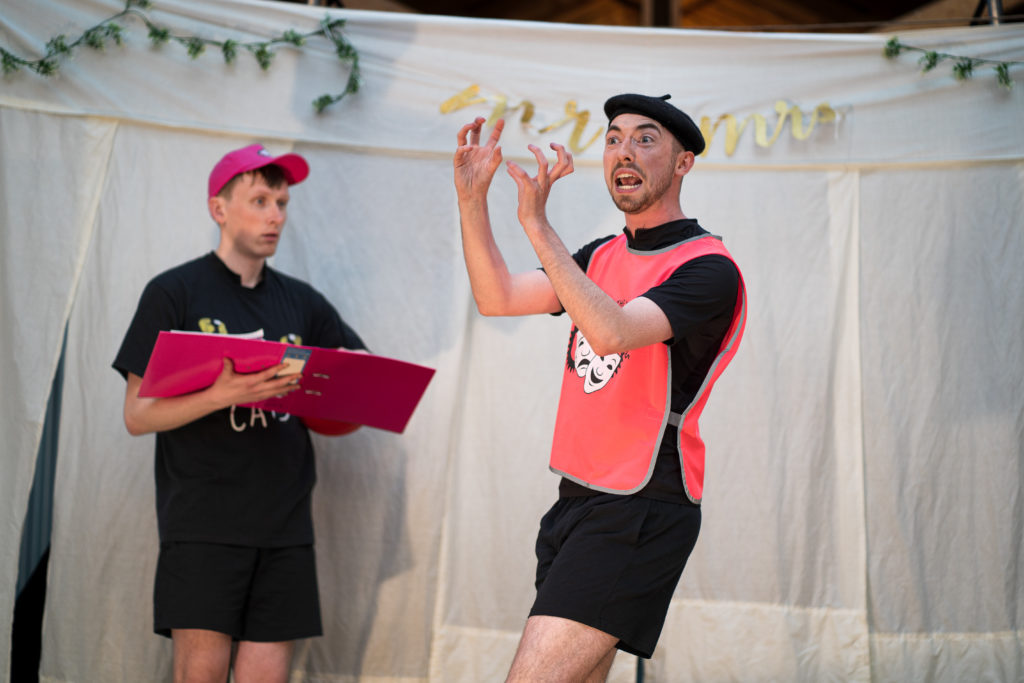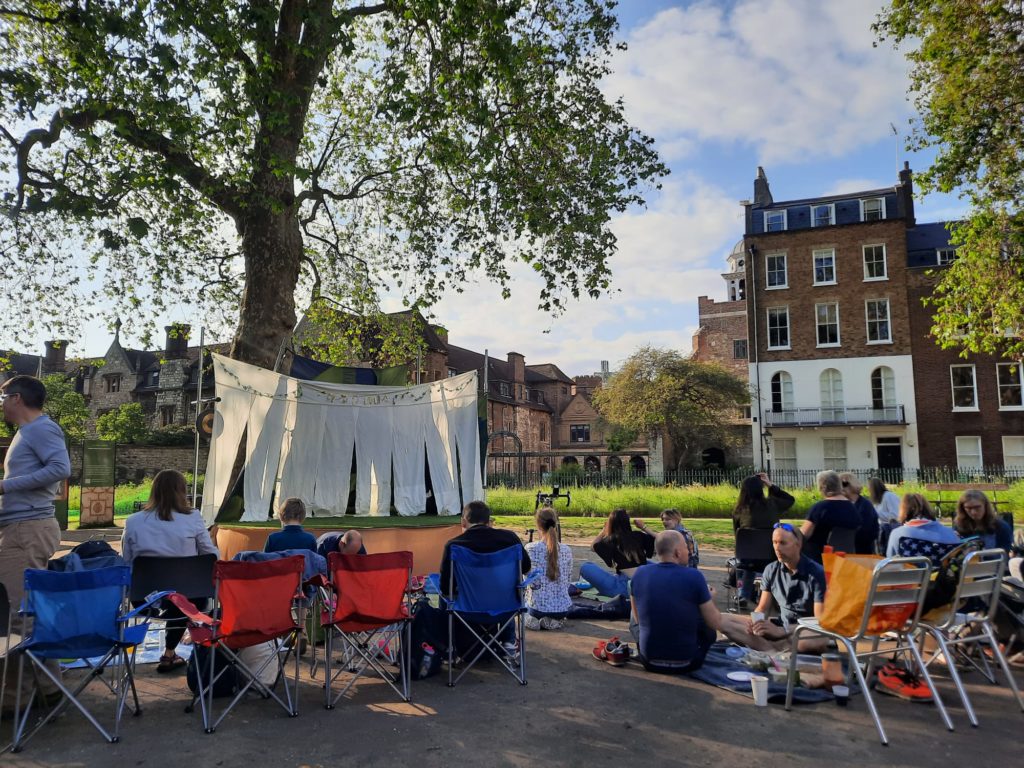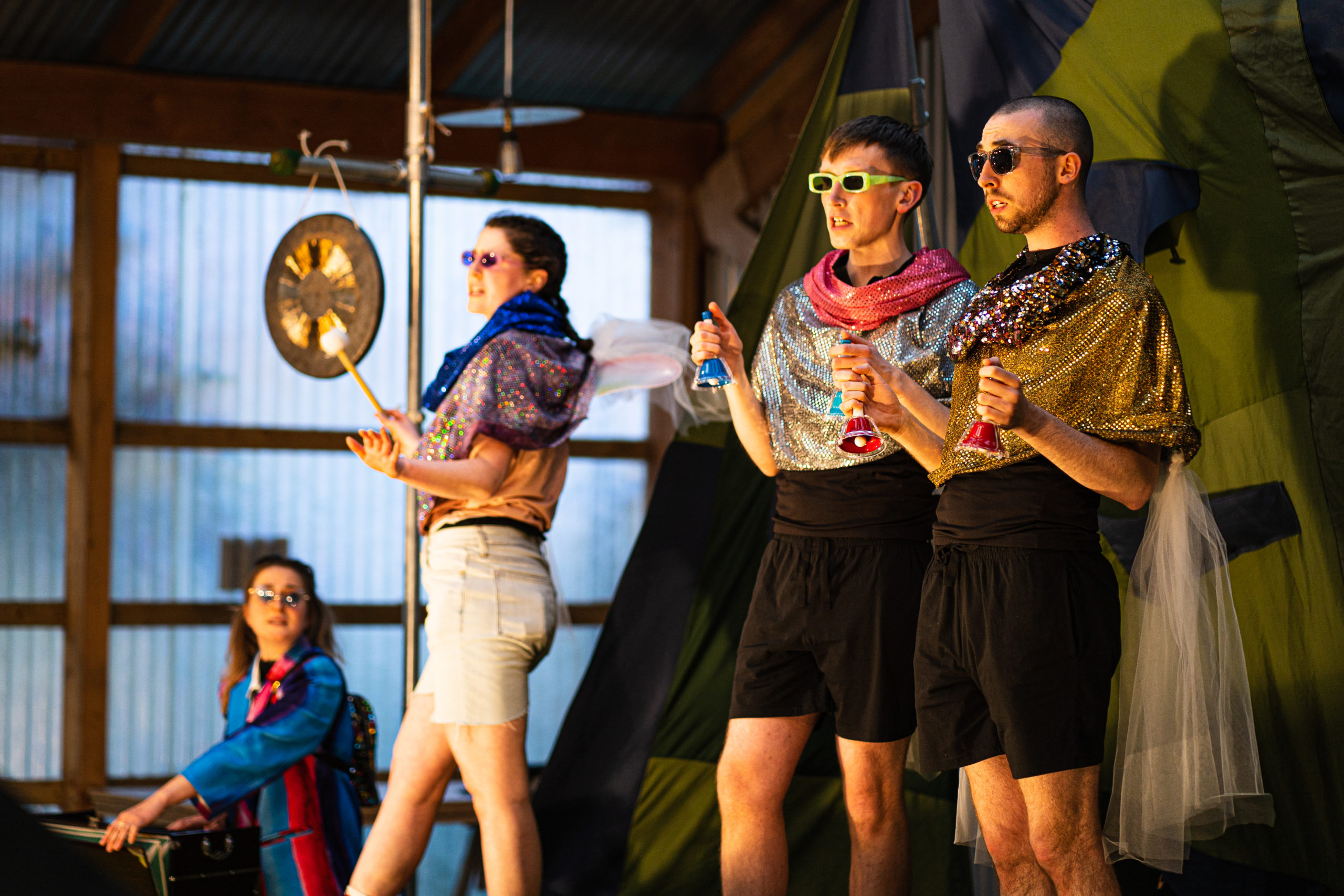A Midsummer Night’s Dream – The Handlebards, London
A Midsummer Night’s Dream in the ultimate pastoral production by sustainable touring company The Handlebards.

The Handlebards: Taking Shakespeare Back To Its Roots
The thing about Shakespeare is… well there are a lot of things about Shakespeare. His mastery of language. The timeless themes. The complex characters. And the fact that some of his plays are almost like a blank canvas. Take A Midsummer Night’s Dream, for instance. Despite the fact that there are three plots going at once (the lovers, the fairies, and the play within a play), each production can be wildly different. In the past couple of years I’ve seen a raucous and riotous version at the Globe Theatre. Plus a reworking by Intermission Youth Theatre into a cautionary tale about drugs.
The Handlebards, on the other hand, take Shakespeare back to its roots. There are probably various ways that you could do that, too, but I mean taking it back to its roots in terms of the audience experience. The Handlebards, celebrating their tenth anniversary this year, take their productions to local communities each summer, carrying their costumes, props and selves on bikes with an electric van to bring the stage. I saw them last night in London’s Charterhouse Square: a perfect historic backdrop on a lovely summer evening.
But in Shakespeare’s time nobody took their sets around in electric vans, I hear you splutter! No, but what struck me while waiting for A Midsummer Night’s Dream to start was the echoes of the past. Part of the enduring appeal of Shakespeare’s plays is the physical and visual humour, and the involvement of the audience. Hundreds of years ago people would congregate in public spaces like this to see a travelling company of actors. There was no expectation of sitting quietly and respectfully in the dark (not that there always is today, either). Theatre in Shakespeare’s time was relaxed, and risque, and funny, and the response from the audience was an integral part of it. The Handlebards tick all of those boxes.

A Midsummer Night’s Dream
Just how do The Handlebards tick so many Shakespearean boxes? For starters, compared to other productions I’ve seen, they dial up the silliness and fun. I’ve commented before on how the Indian ‘changeling’ subplot is a bit problematic and some critics mark productions down for not exploring these dark corners. I don’t really agree with that, but I still didn’t expect to see the changeling skip on stage with blond curls and a sailor suit! Just the fact that there are only four actors and often more than four characters in a scene opens up possibilities for having fun. Lightning fast costume changes are only one of the ways that this is managed. Watch out for a bit of audience participation as well.
The script has also been edited down to a quick, snappy two hours including interval. None of the plot seems to be missing, so I rather liked this condensed version. Director Nel Crouch leaves room for ad libs and jokes with the audience, and plenty of physical humour. The four actors are natural comedians and seem to enjoy the many roles they play. Jenny Smith plays a surprisingly anxious Puck, alternating this with a sickeningly lovestruck Hermia. George Attwell Gerhards makes a more well-rounded Demetrius than some I’ve seen, as well as a delicate Titania. Meredith Lewis (seen recently in The Moors) is no longer the foil for strange happenings around her, instead leaning right into a laddish Oberon and capering Helena.
Finally Alex Crooks, perhaps the most natural physical comedian of the bunch with a very expressive face, plays Bottom, equally sickeningly lovestruck Lysander to Smith’s Hermia, and the lollipop-licking changeling boy amongst others. This really is an ensemble effort, though, with credit due also to the company’s ridiculous French fairies, empty clothing standing in for missing characters, and musical talents amongst the cast.

Looking To The Past For Future Direction?
A thought struck me as I watched A Midsummer Night’s Dream, on a balmy almost Midsummer night in a quiet historic corner of London. Perhaps the key to the future is in taking lessons from our past. Touring theatre productions can have a big carbon footprint, and companies around the world are thinking of innovative ways to become more sustainable in terms of the materials they use or what touring even means.
Some of these are boundary-pushing reinventions of theatre, which audiences may or may not be ready for. The Handlebards, on the other hand, have hit on a very simple but effective formula for sustainability by (consciously or not), looking to the past. Watching a literally pastoral production of A Midsummer Night’s Dream felt like a special moment which connected me with audiences and plays of the past. And, at least equally importantly, I had fun. You can tell that this tour, bringing Shakespeare to sites all around the country, is an adventure for the company as well as the audience. And, with ten years now under their belts, The Handlebards’ model is hopefully one which is here to stay.
Check out the website for listings throughout the summer. If you’re London-based and quick, you can snap up a ticket for a performance at the Museum of the Order of St John on 8 June.
Salterton Arts Review’s rating: 4/5
See here for listings and map of locations (there are a lot!)

If you see this after your page is loaded completely, leafletJS files are missing.

